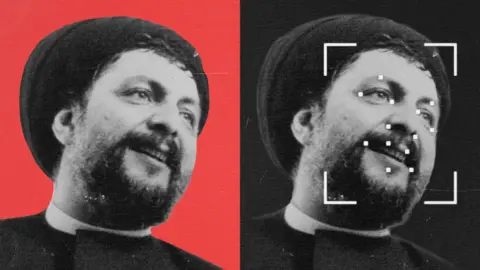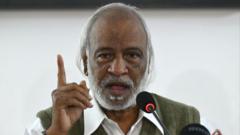Former French President Nicolas Sarkozy finds himself at the center of a significant legal battle, as prosecutors have requested a seven-year prison sentence connected to allegations of illegal campaign financing from the Libyan government during his successful 2007 presidential run. This proposed sentence marks a historic potential punishment for a former president in modern France, emphasizing the gravity of the accusations against him.
Sarkozy, who governed France from 2007 to 2012, has vehemently denied any misconduct related to these proceedings, which commenced in January. The Paris court, where the trial is being held, is expected to hear the defense's closing arguments next month, with the final verdict potentially delayed further.
The prosecution’s request signals that this Libya case poses a more significant threat to Sarkozy's reputation than previous legal battles he has faced, some of which have led to convictions. Alongside the prison term, French prosecutors have also called for a fine of 300,000 euros (approximately $340,000), a ban on him holding public office, and the revocation of certain civic rights.
Despite no longer holding a public office, Sarkozy retains considerable political influence. He responded to the prosecution’s sentencing requests by condemning them via social media, alleging that the accusations are both false and violent. In essence, he suggested it highlights the weaknesses within the prosecution's claims.
The complexities and ramifications of the Libya case are significant for Sarkozy, as it encompasses serious allegations of illegal financial support from Muammar el-Qaddafi, the former Libyan leader, who was killed by insurgents in 2011. The intricate details of this case are expected to unfold in the coming months, and its outcome could shape Sarkozy's legacy for years to come.
Sarkozy, who governed France from 2007 to 2012, has vehemently denied any misconduct related to these proceedings, which commenced in January. The Paris court, where the trial is being held, is expected to hear the defense's closing arguments next month, with the final verdict potentially delayed further.
The prosecution’s request signals that this Libya case poses a more significant threat to Sarkozy's reputation than previous legal battles he has faced, some of which have led to convictions. Alongside the prison term, French prosecutors have also called for a fine of 300,000 euros (approximately $340,000), a ban on him holding public office, and the revocation of certain civic rights.
Despite no longer holding a public office, Sarkozy retains considerable political influence. He responded to the prosecution’s sentencing requests by condemning them via social media, alleging that the accusations are both false and violent. In essence, he suggested it highlights the weaknesses within the prosecution's claims.
The complexities and ramifications of the Libya case are significant for Sarkozy, as it encompasses serious allegations of illegal financial support from Muammar el-Qaddafi, the former Libyan leader, who was killed by insurgents in 2011. The intricate details of this case are expected to unfold in the coming months, and its outcome could shape Sarkozy's legacy for years to come.






















